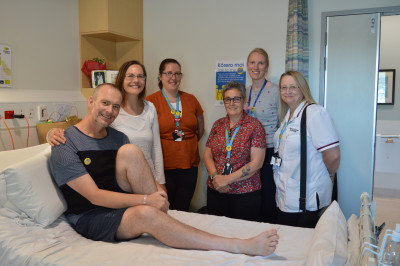Kōrero mai empowers couple to voice concerns

Geoff and Angela are pictured with Capital & Coast District Health Board's Korero mai project team.
When Angela felt her voice wasn’t being heard during her husband Geoff’s stay in Wellington Regional Hospital, the Kōrero mai service supported her to escalate her concerns about his deteriorating health.
‘Geoff’s health was going backwards and he was becoming desperate,’ says Angela.
.
A family member saw a poster promoting the hospital’s Kōrero mai service and suggested Angela use it, so she called the hospital’s patient-at-risk service and spoke to one of the special clinical nurses.
The nurse was able to give Angela the time and in-depth information she needed to understand what was happening with Geoff’s treatment.
Following the call, the patient-at-risk nurse carried out a full clinical assessment of Geoff. As a result, his medication was changed and there was a big improvement in his condition.
Kōrero mai – patient, family and whānau escalation – is part of the Health Quality & Safety Commission’s patient deterioration programme. It aims to help New Zealand hospitals improve the care of adult patients who deteriorate acutely while in hospital by enabling people to speak up.
Patients, families and whānau often recognise subtle signs of patient deterioration even when vital signs are normal. Failure to respond adequately to concerns raised by patients, families and whānau is commonly highlighted in Health and Disability Commissioner reports relating to adverse events associated with clinical deterioration.
The Kōrero mai initiative acknowledges that one of the most challenging areas of health care is communication between health staff and patients. It is the outcome of a co-design process with consumers and health staff working together.
Angela says it was good to have someone willing to listen. ‘The care was great but things were changing so fast and we weren’t always kept informed. I talked through all my concerns with the nurse and she was able to put my mind at ease.’
Both Angela and Geoff say they really appreciate the extra support offered by the Kōrero mai service.
‘Knowing that I’d been re-checked by such a well-trained and professional senior nurse made me feel well cared for and secure,’ says Geoff. ‘It gave me and my family extra support and peace of mind.’
Capital & Coast District Health Board consumer engagement manager, Laura Ellis, says ward staff are to be congratulated for making sure patients and their whānau are aware of Kōrero mai.
‘This was a great outcome for Geoff and Angela and also for our staff.
‘Now that the first stage of Kōrero mai has been successfully established in Wellington Regional Hospital, it will be evaluated through an equity lens. The evaluation will have a strong focus on the voice of Māori, Pacific and disability populations.
